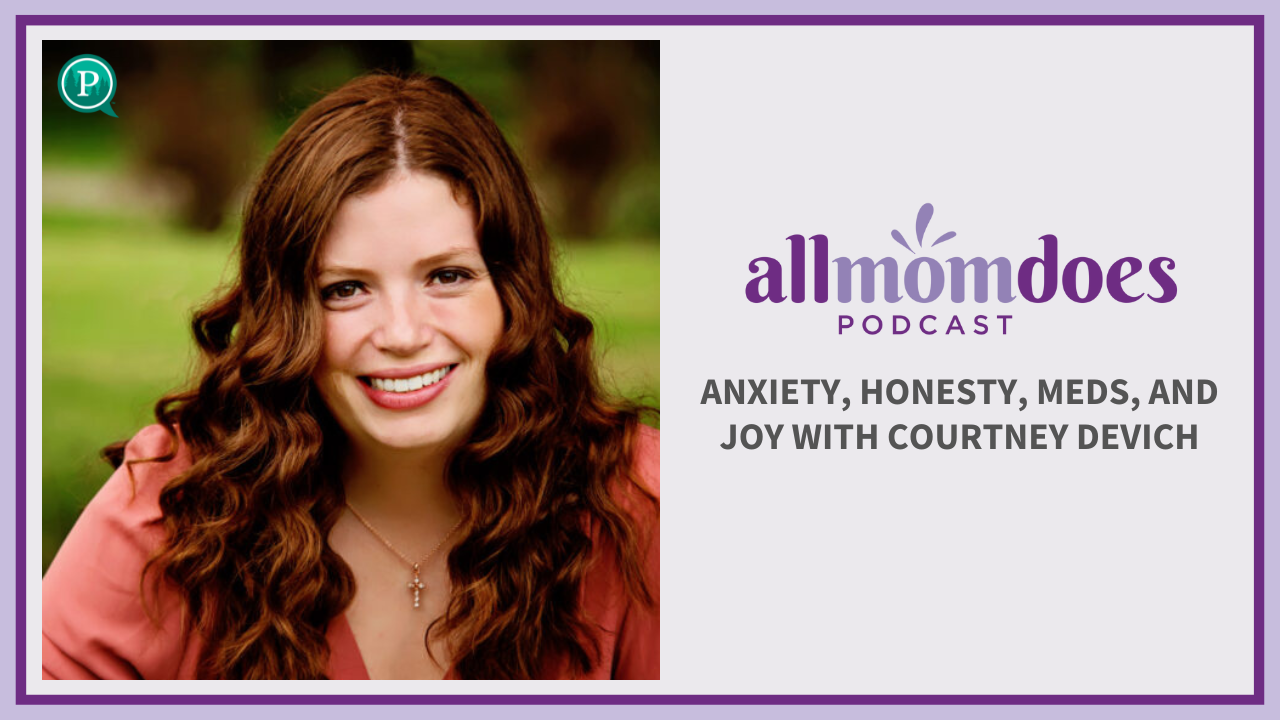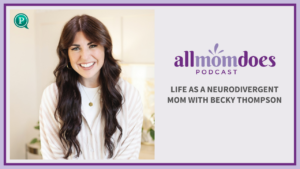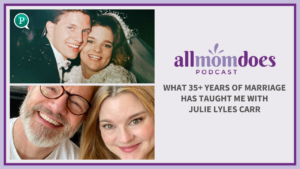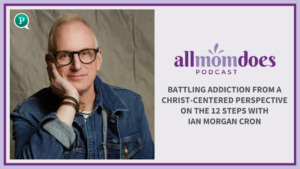Can someone walking closely with Jesus still struggle with anxiety or depression? Courtney Devich is open and honest about her challenges with brain health and she joins Julie Lyles Carr, host of the AllMomDoes podcast, for a candid conversation about her own journey and the wisdom she has for moms fighting back against anxiety.
Show Notes:
Find Courtney: Online | Instagram | Facebook
Book: Mama’s Got Anxiety, But It’s Not Going to Steal Her Joy
Find Julie: Online | Instagram | Facebook | X (Formally Twitter) | Pinterest
AllMomDoes | Instagram | Facebook | X (Formally Twitter)
Transcription:
Julie Lyles Carr:
You probably know the feeling where you’re starting to think you’re just extremely overwhelmed or maybe you’re a little sleep-deprived, or maybe you just need one more big handful of peanut M&M’s. I’m Julie Lyles Carr. This is the AllMomDoes Podcast, and as moms sometimes it can be a little bit hard to identify exactly how we’re feeling because every day brings with it so many different kinds of feelings. Those moments when your kids are being so cute, you can hardly stand it, you just think your ovaries are just going to burst out of joy. Those times when you think if I don’t get some quiet, I don’t know what’s going to happen next. I am so thrilled to have Courtney Devich. She really specializes in talking to moms about all of the different complicated feelings you can be feeling when you’re a mom. Courtney, thanks so much for being on the show today.
Courtney Devich:
Thank you so much for having me. I’m glad to be here.
Julie Lyles Carr:
Absolutely. Now you are a busy, busy woman. You’ve got a full house with three kids, you’ve got a little baby that you are nursing and taking care of and not getting a lot of sleep around. But you also have done a ton of writing in places like Her View From Home, Today Parents, For Every Mom, you’ve got a book, you’ve got all kinds of things that you’re doing, social media presence, all the things. So thanks so much for all that you do to encourage moms today.
Courtney Devich:
You’re welcome. That’s what I’m here for.
Julie Lyles Carr:
Well, you’ve done a lot of conversation around the feelings of anxiety, depression, feelings like that for moms. I want you to take me back and when we talk about anxiety, we’ve had other guests on before. I know that this is something that so many women are grappling with, but why don’t you give me your working definition of what anxiety is. When somebody uses that word, what are they describing when you hear that word?
Courtney Devich:
I would say that probably the clinical or medical explanation of it would be the persistent worry that interferes with our everyday life. My definition would be, I worry I’m scared a lot, just to put it plain and simple, it’s worrying about am I messing up my children, the fears of is something bad going to happen to my kids if I do this or that, or the decisions that I am facing every single day as far as where should I send my kids to school? What should we eat for dinner even because is that healthy? Or Digiornos Pizza? Is that okay? Then it’s just the constant racing mind and those thoughts that I just cannot escape, especially when I’m trying to sleep at night, not being able to turn my brain off, just racing mind over things that I should not even be worried about at 1:00 AM especially when I’m sleep-deprived and I have a baby and yet I still can’t turn my brain off.
So it is fear, it’s worry, it’s obsessiveness, it’s overthinking, and as the clinical or medical definition says, it’s persistent and it’s affecting our lives and it’s affecting our motherhood when we’re not able to enjoy motherhood, and that’s kind of the whole premise of the book is just taking our joy back from our anxiety so that we can enjoy motherhood because these days and the time that we have it with our children is so precious.
Julie Lyles Carr:
And Courtney, as you’re talking about all the things that you’re juggling, the feelings that go on and those feelings of fear and everything else, I’m laughing because I can hear your kids upstairs banging around. And I’m sure that in that way that as moms we’re having this conversation, we’re looking at each other and chatting, but our brains are doing 27 different things also on high alert because we’re trying to make sure, are the toddlers okay? Has the dog been out? Is that package being delivered? It feels like to me as women, the way that our brains need to work today with so much input, with so many things to keep track of, it’s setting us up in a lot of ways, even if we haven’t felt like we were an anxious person in the past. When you have to keep your satellite dish that wide open all the time to be trying to read for every kind of input, it just seems to feed into the feeling. Do you find that to be true?
Courtney Devich:
Yeah, and I mean my oldest is heading to kindergarten here in two weeks, so it’s thinking about all of these other extracurricular activities. We got soccer starting and “Oh, did I get the birth certificate and immunization records?” And just all of those things and I really have tried to tell my kids we’re only doing one activity at a time because I don’t have the bandwidth to be running kids and carting kids everywhere every day of the week. So I think just even all of that that moms have on top of us, taking the kids to soccer practice, and dance, and trying to keep track of it and having calendars for our calendars as well, just puts a lot on the mental load of motherhood.
Julie Lyles Carr:
Calendars for our calendars. Guilty as charged. Yeah, definitely doing that. We’ve talked about some of the emotions that we may become very aware of when it comes to this umbrella of anxiety, but one of the things that I hope we’re getting better about identifying today and thinking about is the physical impact of anxiety. Now, you talked about trying to go to sleep at night and the head spinning and all of the things. What are some other physical symptomology we should pay attention to? Because Courtney, I’ve got to tell you, I would’ve told you for a long time that I wasn’t someone who was anxious because I would get all the things done.
And later I realized that that level of productivity on my part and going, going, going, going, trying to make sure that all these loops were closed, not being able to rest unless these loops were closed. As it turns out, I think that was some good old-fashioned anxiety, and yet I didn’t identify it as such because I was productive, I was getting stuff done, all the things. So how do you navigate that when it comes to the physical symptomology? What should we be looking for? What are things that may actually be anxiety that we didn’t recognize that’s what it was, that show up in our physical bodies?
Courtney Devich:
So all of us are capable of having anxiety. It’s just an emotional response that we have when we’ve got a threat in front of us. It’s that fight or flight response that we all possess. So when our anxiety believes there’s a threat in front of us and there’s not, and it starts taking over, we can start feeling dizzy, lightheaded, shaky. We’re running through in our minds the racing thoughts of what do I need to do to avoid that threat? Or what’s the what if that were to happen? For me, it manifests a lot of irritableness. I’m very, very snappy with my children and I let the anger unleash and the mom rage, which I am not proud of and really working on in therapy right now as we speak actually. So irritable, and the irritableness could be just because the heightened anxiety to the point where we just can’t take anymore, but it also can be because we are not sleeping very well either and we’re tired.
So those are some of the physical aspects of it and a lot of that, if it’s amplified, debilitating, it could be an anxiety attack or a panic attack. Panic attacks are something I haven’t struggled with in a while thankfully. But it is something that I’ve just crippled down on the bathroom floor feeling nauseous, like my stomach hurts, I need to vomit, spinning room. Those are a lot of the physical things that can take over when anxiety kicks in because there’s a threat and I need to fight that threat and take over. It’s the adrenaline rush basically.
Julie Lyles Carr:
Right. You get ready to take off and run or do whatever you need to do even though it may be something that’s just in the mind. I’ve heard people talk about the fact that with all that we are exposed to today, including things like headline news coming across that is something very upsetting or sad, the things that we see on social media and somebody saying, “Hey, be aware I heard about this situation or this case in this other city, so when it comes to your kids, make sure you’re on alert.” We today have access to more information, more alarming information, more concerning information than ever before. So for a lot of us, while we might not have struggled so much with anxiety before we became parents, once you become a parent, there is so much to think about and anxiety can be really heightened during that time, even if you thought that you were always a laid back person.
But Courtney, you and I have both probably heard people say, “Well, if you have enough faith, the Bible says “Fear not, fear not, fear not,” which it does. But how do you make alignment between this very real experience that you’re having of feeling anxiety, of feeling fear or feeling that fear or flight, and yet at the same time you’re a person of faith, and so you may have those voices in your world too who in trying to help, but may be trying to diminish or discredit the very real feeling you’re having. Or you might even end up with a sense of shame. If I just had enough faith, then I wouldn’t be feeling this way. How do you handle all of that?
Courtney Devich:
I’ve had to learn to handle a lot. When you’re posting about it on social media to the whole world of strangers, you get a lot of the, “You just need to pray more. It’s the Devil and you need to have more faith, and you need to believe more.” The Bible does say fear not a lot, but a lot of the times when I’m also looking through those verses, it’s saying, “Fear not for I am with you. Fear not for I will uphold you with my righteous hand.” So God is constantly reminding us not to fear, but he also on the other side of that verse, most likely than not, is saying, “I am with you and I will be with you and I will uphold you. I’ll strengthen you. I will not leave you or forsake you.” So He’s giving us that comfort right there. It’s not necessarily like a, oh, fear’s not going to happen because it will. This world is scary.
But when it does happen and when fear does come knocking, I am right there beside you is the comfort that I find from it. And the whole biblical foundation of my book is Psalm 94:19, which is, “When anxiety was within me, your comfort brought me joy.” So it is about the comfort that we’ll receive from God and His word and finding our joy in that.
So kind of going backwards to what you said there, I really just try to, when I’m met with people that are saying, “Just pray more, believe more, or you don’t have enough faith,” trying to remind people and spread the message that anxiety is a mental health condition. When you have an anxiety disorder like I do, and like so many other people do, anxiety disorders are the most common mental health condition out there. Women are twice as likely as men to develop one as well, which I think motherhood has something to do with that and contributes to it.
Julie Lyles Carr:
Might do a little bit, yup.
Courtney Devich:
So it’s about just kind of educating as well and meeting them. A lot of times those comments are coming from a place of love, and I have to remind myself they don’t know what my faith looks like. They don’t know that I read my Bible and they don’t know that my anxiety actually has brought me closer to God because when I’m anxious, I am turning to scripture, I am turning on my worship music, I am praying. So I believe that my anxiety has brought me closer to Him. I believe God can use other people’s anxiety as well to bring them closer to Him. So educating people about the realness of anxiety disorders and that it’s a mental health condition, just like any other … Cancer, diabetes, that we face in this world, anxiety is another one. And just meeting them with love, educating, and sometimes just having to say, “Nope, you’re wrong. I’m sorry, and I’ll pray for you.”
Julie Lyles Carr:
Yeah. Why do you think that oftentimes as people of faith, we have an easier time accepting certain physical conditions, physical limitations, physical illness processes, and yet we struggle still in this area that has to do with emotions even though our brains are a physical component of our physical body? What’s your opinion on why we still seem to struggle in this way, in the faith communities to accept that mental illness, mental issues that arise are treatable, are things that we can do things about, and it’s not something that is necessarily like taking you down a path in any other way than something like a other physical ailment would do?
Courtney Devich:
I think it’s because we can’t see it. It is something that nobody, unless you physically have walked through it, you don’t really understand the torture that it can bring, especially when it comes to things like depression as well and just how dark it can get, the intrusive thoughts with depression or anxiety as well. My anxiety can cause intrusive thoughts as well. So I think that not being able to see it is a big thing.
And then I think also just kind of taking a lot of biblical verses and just little chunks of them and coming to our own conclusion of, oh, the Bible says do not be anxious. Well, the Bible also says, “But in everything, thanksgiving, prayers and petition, take it to God.” So it’s not always just a do not be anxious, but let’s take it to God. Again with the, “Do not fear, fear not.” Well, because God is with us. It is an emotion for sure, anxiety and fear, and some people don’t struggle with it as much as others because it is that chemical imbalance in the brain or a biological genetic causes the brain to have an anxiety … When you’re battling an anxiety disorder. So everybody’s capable of anxiety, but the anxiety disorder just takes it to a whole other new level, and it’s not something that people can see on the outside.
Julie Lyles Carr:
Right. There’s a lot of controversy still in our faith communities about mental wellness, about getting help, about going to therapy, about medications. How have you aligned that while also having deep faith in God? You’ve been very transparent about the struggles that you’ve had, the challenges you’ve had. You clearly have found an audience that is like, “Yeah, same here. Me, I’m grappling. I’m needing help,” whatever. So how are you navigating that place interpersonally, and how do you see that when it comes to receiving the kind of help that helps you fight back against this anxiety disorder with faith and with the tools that God has allowed us to have insight and knowledge into today?
Courtney Devich:
The way that I see it is medication and counseling is a gift from God, just like medication or insulin for diabetes. If we had a migraine, we would take some Tylenol for it. If we had cancer, most likely a lot of us would choose to go through chemotherapy, radiation, having it removed surgically. So while those are all gifts from God and the gifts of medicine and all of that, I also believe that medication for anxiety or depression and counseling is also a gift from God, and that’s one of the ways that he can heal us. I’m not going to lie, it was really hard for me to go back on my medication. It’s been like two years ago now. I was off of it for three years doing great, and then COVID happened, I had another baby, and now I’ve had another baby on top of that baby, and so I’ve had to go back on the medication. It was hard to do because it was like I was doing great. I’m such a failure, I should have been stronger.
And I just had to remind myself, nope, life just got hard right now, and this is okay because this is going to help me get through this, and my kids need me to be the best that I can be for them in this season. And this is one of the ways that God helps me, and that’s the same with therapy. I actually just recently started therapy again here two weeks ago.
I’m battling a little bit of postpartum depression here. I’m three months postpartum with baby number three. So I was like, nope, I’m going to do it. And my pediatrician was very like, “Okay, do we need to up your meds or something?” I’m like, “I’m going back to therapy. Let’s take it one step at a time.” I’m going to be proactive about it because I have no shame in going back to therapy and this is something that’s going to help me and help me get through this season because it’s been a tough season. There’s three of them now.
Julie Lyles Carr:
Right.
Courtney Devich:
So yeah, I’ve just proactively done that to take care of my mental health and trying to just be the best mom that I can for my kids because it’s been hard.
Julie Lyles Carr:
Yeah. I mean I so appreciate just how open you are about that because so many women need to be able to hear that and need to know. And you bring up something that it’s so important that often doesn’t get talked about. I have a friend I was talking with recently who really battled some significant anxiety and she got herself into therapy, learned a lot of tools, has done phenomenally well over the last several years, and now finds herself in a place again, and there’s not been a major life event. She hasn’t had a baby, nothing like that. But she’s found herself again going, oh, she’s heading into a new season of life and she realizes, “I need to head back and get kind of a tuneup.”
And she was very clear about, “It’s frustrating because I thought I kicked this to the curb. I thought that I had conquered this.” And we had a really great conversation about these things are not a one and done. You gather tools, you use the tools, you back up, you try again, you keep reading, you keep educating yourself. Sometimes that means going back into a counselor, sometimes that means getting pastoral help, but that there’s no failure here. This is not a failure of having, “I didn’t conquer it.” It crops up. It’s what you do when it crops up again, that becomes of critical importance.
How often do you find people in your world having seasons where they’ve got it under control a little bit more, if you will, and then seasons where they need to go back and review some of the things? I mean, is that pretty common to your listenership, to your viewership that you see this come up?
Courtney Devich:
Yeah. I mean, I hear a lot of the, “I’ve been healed.” I get some comments about that. Like, “Oh, the Lord delivered me of this and I’ve been healed.” And a lot of times that makes me feel like, “Okay, why haven’t I been healed?” Or can make other people feel like, “Okay, what? Am I not praying hard enough or did I do something wrong? Is this punishment?” So I do get a lot of people that will say they have been healed, and I am very leery of ever saying I’m healed, it’s done because I do know my personal life it has been, it’s ebbed and flowed. There’s been times where I have struggled way more with depression than I do with my anxiety. And then there’s other times where my anxiety is debilitating, crippling, I can’t leave the house, but depression’s not looming over my head.
So it has been up and down for me for most of my life, to be honest. And I do get some moms that will say, “I battled postpartum depression, and now I’m over it, to the other side” and that’s great. And there’s other women though that we need to head on back and help pull them through as well. So I do think that it just depends on the season of life and like I said, right now I’ve got three month old, I’ve got a book baby I’m launching, I’ve got a kid going to kindergarten, I’ve got another kid that’s going to start preschool. So it is just a busy, hectic time in my life with a lot of transition, a lot of new things, a lot of stress, and so that was when it was just like, okay, yep, nope, it’s time to go back to therapy and take care of some stuff again.
Julie Lyles Carr:
Right. How do you navigate the little eyes, the little ears that are always watching us?
Courtney Devich:
Can’t pee in peace.
Julie Lyles Carr:
Oh, yeah. Exactly. They want to be with you all the time. They want to see everything. They want to observe it all. And even the things that you think they aren’t watching or aren’t aware of, they are. They’re watching all of it. So how do you navigate this place of wanting to be open with your kids and honest with your kids and yet at the same time, not necessarily make it so that being anxious all the time is normalized? Does that make sense? This isn’t necessarily the operating system that we’re trying to operate off of. At the same time we’re wanting to be honest about our feelings. How do you do all of that?
I know that with one of my kids, I’ve written about it before that that child struggled with some anxiety in a very significant way as a younger child, and I felt so much guilt at times, honestly, Courtney, because I knew that during that pregnancy, I was super anxious during that pregnancy. And then here comes this child who really grapples with it and worries about all kinds of things and has all kinds of intrusive thoughts, and I’m like, “That’s my fault. This kid was in an amniotic bath of my anxiety the whole time I was carrying them.” So how do you work with all of that, both identifying for your kids how you’re feeling, but also trying to help them not necessarily catch your feelings, keep all of that kind of navigable for everybody in a healthy way? What do you do?
Courtney Devich:
Yeah, so I’ve been very, very transparent with my children as far as this is mommy’s medication that she takes for her brain because sometimes she gets anxious. I don’t try and hide it from them or anything. I want them to know that it is very normal, like just going to the pediatrician or the dentist when I take them to see those, “Okay, mommy’s going to go talk to her feelings friend, that’s my therapist and it’s normal.” I want them to know that because if they ever … Because more than likely with my history, they could also struggle with depression or anxiety at some point in their life, and I want them to know that there is no stigma with that and that there’s no shame in getting help if they ever needed to. I would say as far as just, we talk a lot about emotions in our house, lots of books about reading about emotions, how to identify them.
My son has gotten really good at knowing the difference between anxiety or anger and all of these things, and I want them to know when mommy is feeling a little bit on edge, it’s something actually that I talked about in therapy just last week. Because my depression right now has been kind of manifesting as anger, and so right now I was like, “Well, we’re going to have a code word for when mommy is starting to feel her anger creep up and she feels like she’s about to snap, I’m going to say a word and when you hear that word, I want you to know, okay, mommy needs a minute. Mommy needs to just cool down. She needs a moment to collect herself because otherwise Mommy is going to probably yell at me and she doesn’t want to,” is what I’ve explained it to him. Mommy doesn’t want to, especially when it’s just simple things like they would need another fruit snack or something.
“Mommy doesn’t want to be on edge right now, but Mommy is having a really hard time dealing with her emotions specifically right now, her anger.” And so our code word right now is peaches. So when mommy says peaches, you’ve just got to give me a little moment here. So being transparent and talking with them like that, and sometimes you kind of have to tailor the message. My three-year-old is not quite understanding yet, but my five-year-old, he gets it and we’ve talked through a lot of different anxiety stuff with him as well. He struggled a little bit when he started pre-K last year with the separation anxiety. And so we’ve had to work through some of those feelings. So he gets it a little bit more than her.
But as far as trying not to pass my fears on down to them or having them catch my anxiety in a sense, it’s just really giving them the bare minimum of what they probably need to know. So why does Mommy not want you to be playing out in the front yard? Well, because Mommy cannot see you, as opposed to where my brain is thinking, because somebody could steal you and kidnap you and then you’ll be gone forever. That was what my anxiety’s telling me, but okay, nope. I need you to stay in the back because Mommy needs to be able to see you to make sure that you are safe and you’re doing what you’re supposed to be doing or not doing what you shouldn’t be doing.
So giving them just little [inaudible 00:25:48] pieces of information to where they understand there could be a threat if I’m outside playing by myself or something I shouldn’t be doing, but not giving them overload information of all of the what ifs that are going on in my head, so that I’m not making them overly anxious, or making them overthink things, or make them think that this world is terrifying. I need to stay in my bedroom and never leave, kind of thing.
Julie Lyles Carr:
Right. That’s a really great way to describe that in terms of still keeping it honest, but not overwhelming them with the level of information. I love that.
Courtney Devich:
Yeah, I’ve got a lot of things going racing in my brain, but they don’t need to know all that.
Julie Lyles Carr:
They don’t need to have all that. Right, exactly. What is the relationship, and how do you manage the relationship in a pretty delicate spot, which is that dance between anxiety and control? I know some people, I’m sure I’ve done it myself, that in an effort to manage their anxiety, they’re trying to control everything. If they can get the environment to be exactly right, if the house can look exactly like this, if everyone can act exactly as they need them to act, then their anxiety will be under control.
I’ve even seen that control issue crop up, and it is couched in language that kind of is a king’s X for a lot of us, which means, oh, this is my boundary. And actually what’s happening is you’re trying to control everything so you don’t feel anxious and you’re trying to control others’ behavior and you’re calling that a boundary, which that’s not a boundary. A boundary is about what you are going to do in any given situation should something come up. Not what everyone else should be doing. How do you talk to people about that, that place where the antidote to anxiety is not being able to control everything?
Courtney Devich:
Well, that’s a good question because it’s something I really, really struggle with still myself, and so it’s hard to sometimes give advice to people when I’m like, I’m right there with you, sister. So for me, I would say, I know a lot of moms that their way of controlling is the house needs to be spotless. They are obsessively cleaning their house because if there’s too much, they get just overstimulated and it makes them anxious. I am not like that. My house is very messy until it gets to the point where it is a problem.
So it’s funny how anxiety can be completely different for two different women or men or whoever in respect. Something that makes one person anxious is going to not make another person anxious. So for me, as far as control goes, I’ve got to take care of the to-do lists and the bills and the grocery shopping and all of the things because if something happens and we drop the ball and that bill didn’t get paid, then my water’s going to be turned off. Or if I’m not managing all of the to-do lists that need to be done for getting school ready, then the birth certificate’s not going to get turned in, the immunization records won’t be there, and my kid’s not going to be able to start on time.
So it’s constantly just reminding myself of, okay, that’s what I feel like I need to control to manage my anxiety and make sure that I’m not anxious because I’m controlling it. But what is really the worst case scenario that could happen? Okay, my water gets turned off, I pay the bill, it gets turned back on. Or my son can’t start right away on day one, but I’m going to run back 20 minutes to the school and make that copy right then and there, and he will be there. And just kind of reminding myself that it’s a little bit okay if things go wrong and that the worst case scenario of it is not that bad.
And then obviously other little things like if I’m behind the wheel of a car, then that means that I can’t get in a car accident. Well, that’s not true because there are other people in the road that are bad drivers. So just kind of having to rationalize the fear of why my anxiety thinks I need that control and bringing it back to, okay, nope, what’s the worst case scenario that could indeed happen here? And it’s really not something to get that anxious about or let it take my joy in this moment because it doesn’t need to control me that much.
Julie Lyles Carr:
Right. The relationship between control and anxiety is so fascinating because oftentimes we use control to try to mitigate the anxiety, but then actually the anxiety is controlling us.
Courtney Devich:
And I hear some people say, “I’m just type A and I just need to be very organized and very organized and structured and everything.” I’m like, “Are you or do you have some anxiety? Just being a little bit honest here with you?”
Julie Lyles Carr:
Yeah. Exactly. Well, so many great thoughts and I’m so excited because in addition to the beautiful community that you’ve developed, and I want to make sure we direct the listeners that way, a great community where people can talk about these things, find people who are struggling with these same issues, and yet at the same time, offering a great deal of hope and a great deal of joy. You’ve got a book coming out called Mama’s Got Anxiety, But It’s Not Going to Steal Her Joy. That title is so fun.
Courtney Devich:
Thank you.
Julie Lyles Carr:
Where can the listener go to find your community that you’ve built, find out information on the book, all the stuff?
Courtney Devich:
So pretty much all of the book links as far as pre-order links and pre-order bonuses would be on my website. It’s courtneydevich.com. And then connecting with me through social media, I’m on Facebook and Instagram at Courtney Devich Author, so you can connect with me there as well. And the book is available September 5th, coming up really quick here.
Julie Lyles Carr:
Awesome. Well, Courtney, thanks so much for being on today. I know that the journey that you’ve had and your willingness to share that journey, the journey you’re still on is of so much help to so many moms. So thank you so much for that. And Rebecca will have those links in the show notes, so we’re going to drive listeners to those places. They can go find you in all the spots. Be sure and check out allmomdoes.com and AllMomDoes on the socials because that’s also a great community where you can find other women who are walking through the same seasons of life as you, going through some of the same stuff. And I love to connect with you too at Julie Lyles Carr on all the places, particularly Instagram. Come see me on Instagram. And be sure and share this episode, grab that link and share this episode with another mom in your world who is grappling with anxiety and it had taken some of her joy. Be sure and share this because I know it’s going to be of such help to her. So Courtney, thanks again. We so appreciate you.
Courtney Devich:
Thank you so much for having me.
Julie Lyles Carr:
And my dear listener, I’ll see you next time on The AllMomDoes Podcast.
Follow this podcast:







